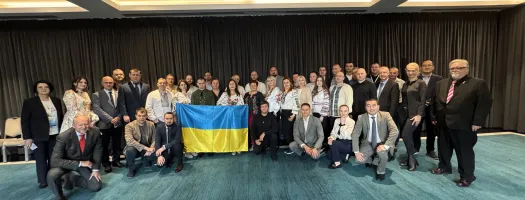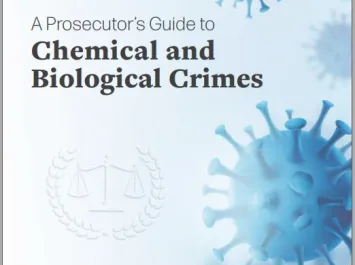As threats involving chemical, biological, radiological, and nuclear (CBRN) materials grow more complex, Ukraine is strengthening its preparedness through hands-on legal training. Central to this effort is a Mock Trial exercise, a practical component of the European Union (EU) Chemical, Biological, Radiological and Nuclear (CBRN) Centres of Excellence (CoE) Initiative, aimed at improving the country’s capacity to investigate, prosecute, and adjudicate crimes involving CBRN elements.
Held in Chișinău, Moldova from 29 to 30 May 2025, the Mock Trial marked a critical milestone in a broader, multi-phase training programme entitled “From the CBRN Crime Scene to Courtroom and from Courtroom to Classroom”. Designed in collaboration with the United Nations Interregional Crime and Justice Research Institute (UNICRI), and supported by the European Union Service for Foreign Policy Instruments, the initiative provides a comprehensive pathway for CBRN practitioners to translate theoretical learning into real-world settings.
Unlike traditional classroom instruction, this immersive trial simulation convened professionals from across the criminal justice system — including prosecutors, judges, investigators, law enforcement personnel, CBRN forensics, and laboratory analysts. Through realistic case scenarios, participants engaged in role-specific tasks, mirroring their actual duties in the judicial process. Their interaction not only enriched the learning environment but also offered immediate, expert feedback on performance.
Participants were divided into two teams, each tasked with handling a mock criminal case from investigation to courtroom adjudication. One group focused on the prosecution of a simulated chemical incident, while the other worked on a fictional radiological or nuclear event. Significantly, each team also took on the role of defence counsel for the opposing side’s case. This dual-role setup expanded their perspective, enabling them to appreciate both prosecution and defence tactics in CBRN-related litigation.
What sets this training apart is its direct connection to Ukraine’s domestic legal structure. The scenarios and proceedings were grounded in the country's Criminal Code and Criminal Procedure Code, ensuring that all actions were legally sound and procedurally accurate. This fidelity to national law reinforces the training’s relevance and makes it immediately applicable to the day-to-day responsibilities of Ukrainian judicial actors.
The Mock Trial was not an isolated event but the culmination of a four-part series that included a Tabletop Exercise, a CBRN Criminalisation Workshop, and a module on Building a Case for Prosecution. In total, 32 Ukrainian participants completed this intensive curriculum and received official certification, recognizing their preparedness to handle the unique challenges posed by CBRN incidents.
To guarantee the long-term sustainability of this initiative, a Train-the-Trainer programme will soon be launched for 15 Ukrainian instructors. These trainers will be equipped to deliver future courses domestically, integrating this specialized expertise into Ukraine’s national training infrastructure.
This pilot project has already generated international interest. Seventeen countries have formally requested access to the same training modules to build their own internal capacities for CBRN incident response. By tailoring the methodology to each country’s legal and institutional framework — adopting a “bottom-up” approach — the EU CBRN CoE Initiative ensures that its support is both context-specific and sustainable.
Ultimately, this initiative represents a powerful step forward in global CBRN security. By investing in practical, legislation-aligned training for legal and investigative professionals, the EU and its partners are helping nations like Ukraine build a robust, coordinated response capability. The Mock Trial and the broader training programme are laying the groundwork for a safer international community, equipped to confront the evolving threats of CBRN crime with professionalism and precision.



